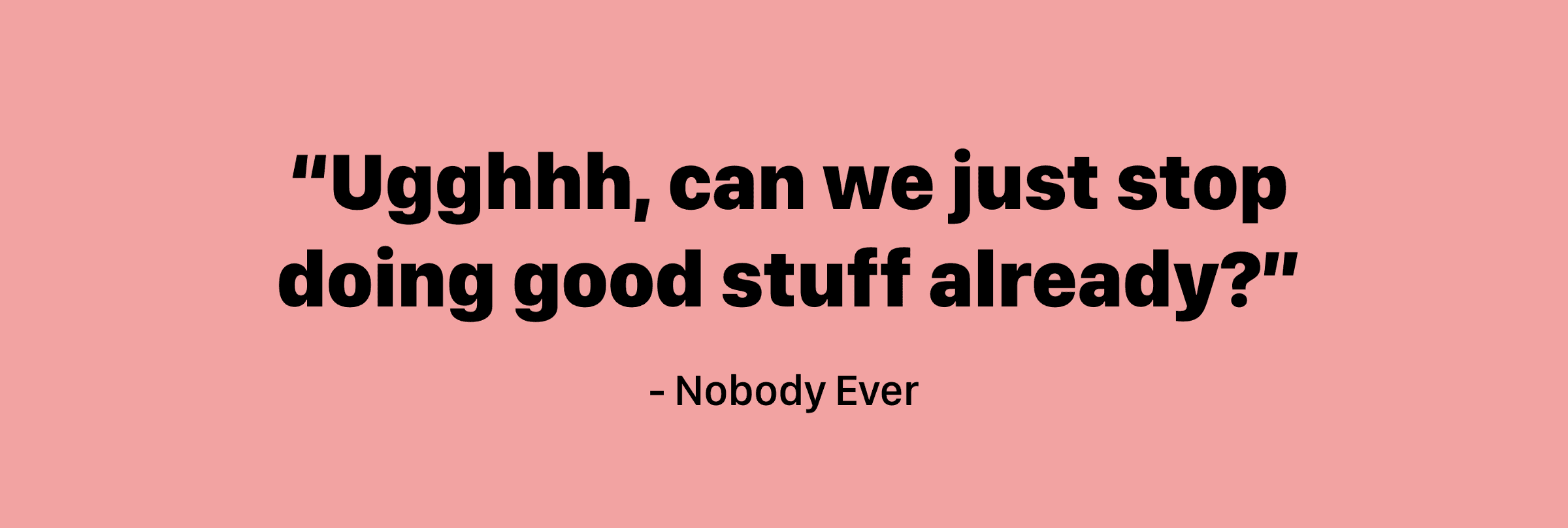The wit and wisdom of George Smith — Good: the case for a re-launch
In a classic essay from the mid-1990s, George Smith explains why the concept of good is in trouble and how we can save it.
- Written by
- George Smith
- Added
- May 01, 2019

The charity backlash of the me-generation is about to begin unless the giving public can awaken to their social responsibilities. So says George Smith in this classic from the mid-1990s, as he explains why he thinks good is in trouble as a concept.
From February 1993
Reprinted from Up Smith Creek, with permission.
I don’t mind you knowing that just before Christmas I was sitting in the Grill Room of the Savoy with a couple of very liberal captains of industry. I mean this: both captains were of distinctly liberal persuasion, responsible both for giving away large amounts of money and for convening other people to give away even larger sums of money. They were – and are – knee deep in good causes. The caviar was being spooned around, but don’t see them as ogres – this is Big Gift country I’m reporting.

With thrilling lack of taste in the circumstances, talk turned to the Third World and a recent report that one of the captains had picked up suggesting that a generation of development aid to poor countries had been worse than a waste and had actually amounted to a block on the development of those countries. Somehow we moved on to London’s homeless who must have been depicting a vivid need a hundred yards away from our burgundy. And then we got into social work generally and how it was a pity that all social workers lived in Islington, had never done a day’s decent work in their lives and spent all their time training each other in the black arts of interference. Time did not allow, thank heaven, for a reactionary discourse on animal rights fanatics, sexual minorities and other tribes beyond the pale.

It was the taxi-driver school of social analysis and I bring you this reportage from the Great and Occasionally Good because it embellishes my belief that the Devil is beginning to get too many of the good tunes. We live in a jaded society, increasingly suspicious of the value of good, increasingly resentful that there are no apparent simple solutions to any evil. Apathy is beginning to seep through all of us, apathy born of scepticism.
Charities had better start taking this seriously for they have enjoyed a generation who were prepared to believe not just in altruism, but also in the achievement of altruism. If that generation now becomes tainted with disbelief and if they are succeeded by a generation with its heads stuck into Nintendo games, then we’re all in for a troubling time. Philanthropy could quite easily become the pastime of the elderly, comfortable middle class – which it was until around 1960.
Yet I hear no one prepared to admit that the conventional wisdom of twenty years ago was ever misplaced.
My fear is that many organisations are now so locked into their own tribal passions, cultures and vocabularies that the real hinterland of public communication is sliding past them as they leave the port where once they were anchored. I do not have to be reactionary to be bored and desensitised by those many organisations on my radio every morning baying for ‘more resources’ as the answer to any social ill. Don’t they know that the country recently voted emphatically not to pay more in taxes?
We have fallen into the habit of simply putting a price tag on every social need. In recent weeks, I have heard school bullying attributed to boring playgrounds. I have heard the famine in Somalia attributed to debt charges. I have heard the Shetlands tanker disaster blamed on the government (and I do wish that opposition spokesmen would cease this habit of the predictable sound bite).
But the listening natives are getting restless. They read that there are now as many AIDS workers as victims, they read of social workers behaving like the Spanish Inquisition, they read about maniacal warlords in Bosnia and Somalia. And they increasingly cannot make the connection between the obvious evil and the promised good.
In the seventies I ran a campaign for mental health organisations that preached against institutional care and made the case for community care – a battle that we won. But, when I look around the streets of London, I cannot be proud of that victory. Yet I hear no one prepared to admit that the conventional wisdom of twenty years ago was ever misplaced.
Similarly, with the Shetlands tanker disaster: I have heard the blame fall on the tanker owners, the government and the Poles and Greeks who made up the crew. Only once have I heard anyone (and it must have been Greenpeace) say that such disasters will always happen if we allow oil to be transported across the world at the current rate of nautical knots. In other words – and let’s say it loud – it is our fault for worshipping the internal combustion engine. The link between the dying cormorant and that lump of metal in the garage is a direct one.

We need more candour, a greater indication that we can still think imaginatively and liberation from our predictable vocabularies. For Good is currently in trouble as a concept.
© The White Lion Press Limited 2019


















